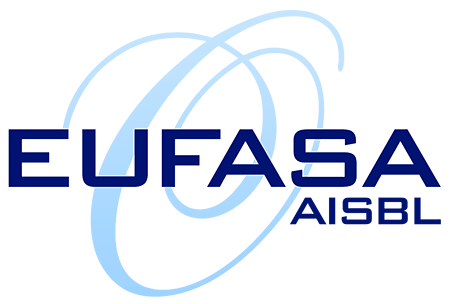
Lisbon 2021
The 37th Annual EUFASA Conference took place in Lisbon as well as on-line on 17 and 18 May 2021. It brought together delegates of 18 EUFASA member associations (out of 19), as well as observers from Malta, the Netherlands and Slovenia. The Hungarian association was welcomed back as a returning member of EUFASA.
The first session and “tour de table” gave the opportunity to the delegates to briefly present their associations, outlining any achievements or set-backs in 2020-2021. The majority of associations felt that the pandemic had resulted in a revival of their association and tighter relations with their members. The use of on-line platforms for meetings allowed participants from all over the world to connect with each other and exchange information. While some associations shared positive news regarding their MFA’s participation in spouses’ private pension funds or their system of compensation for lost pension rights, others are still struggling to maintain or reclaim the support of MFAs for their association, for pension provisions and for the financing of travel expenses as well as children’s education fees.
EUFASA Partnership Issues (EUFASA Research Department)
Ireland (Chair), Austria, Czech Republic, Finland, Iceland, Lithuania, Switzerland, UK
The objective of the EUFASA Research Department is to produce high quality research results that encourage MFAs toward better support of partners and spouses.
The working group presented a research study conducted in 2020 on “Employment, the role of the spouse and mental health” which highlighted that high international mobility of accompanying spouses and partners weakens their attachment to the labour market and that spouses of foreign affairs officers generally lack proper information on employment-related administrative issues when posted abroad, such as taxation, social insurance and health insurance. The study also gathered findings on the involvement of spouses and partners in diplomatic activities and on the impact of mobility on mental health.
The group further presented findings from another survey conducted in 2020-2021 on the “Impact of the Covid-19 pandemic on spouses and partners”, which found that having a contact person for spouses and partners or Family Office in the MFA and having clear policies and measures to reduce risk of covid-19 at representations abroad was associated with less stress and burn-out.
Working Group on Mediation and the UN Security Council Resolution 1325
Italy (Chair), Austria, Belgium, Czech Republic, France, Ireland, Portugal
The Working Group organised in November and December 2020 four webinars in cooperation with the University of La Sapienza in Rome on the topics of women, peace and the security agenda. The aim of these seminars were to provide relevant career-oriented training, as well as to give spouses and partners better information about the positive impact they can have as a spouse on posting. These training sessions were highly informative and well attended by the EUFASA network.
EUFASA Working Group on Legal Matters
Spain & Switzerland (Co-Chairs), Austria, Belgium, EU, France, Italy, Portugal
The EUFASA member associations formally adopted the “Declaration on the Rights of Foreign Service Families”, a non-legally binding document which attempts to harmonize the standards and the practices related to the relations between the State administrations and the Foreign Service families. The Declaration brings together in a single document the most important EUFASA recommendations formulated over the past 30 years and shall serve as a tool for associations to lobby their administrations. It covers all aspects of the Foreign Service families’ lives: spouses, children and other family members, social elements, medical care, education and annual trips, among other issues. The formal signature of the declaration will be arranged at the next EUFASA Conference in Paris in 2022.
Following the official constitution of the EUFASA AISBL as an international non-profit organization under Belgian law on 3 December 2020, the Legal Matters Working Group organised the transition from the ‘old EUFASA’ to the new ‘EUFASA AISBL’. The Working Group also prepared the first General Assembly Meeting of the EUFASA AISBL, which took place at the Lisbon Conference on Monday 17 May.
Mobility with Children with Special Educational Needs and Disabilities (SEND)
Presentation by Amanda Neil, Advisor on Special Educational Needs and Disabilities at the United Kingdom Diplomats Spouses & Families Association
Despite the fact that approximately 5% of children have special needs or disabilities, very few MFAs provide comprehensive information and support to families of officers travelling abroad with SEND children. The UK Association shared some of its best practices in this regard, namely the creation of a database of relevant information and the inclusion of this information in post reports, especially with regards to schools providing support to children with SEND; to have a contact point within the HR department and/or spouse association regarding issues relevant to families with children with SEND; to create a support network of families with SEND children in view of sharing information; and to negotiate a proper travel package for dependant family members.
EUFASA Work & Employment (EWE)
EU & Germany (Co-Chairs), Finland, Ireland, Italy
The Working Group presented the results of a study carried out in 2020 on pension solutions in EUFASA member countries. Pensions remain a key topic for foreign affair spouses and partners. A study carried out in 2019 showed that the loss of pension entitlements represented a significant stress factor for half of the respondents in the survey. The study pointed out that models adopted across Europe are quite diverse. They vary from full pension guaranteed by law (Finland) to a minimal pension guaranteed by law for spouses without their own income (Czech Republic), some contribution based on policy (United Kingdom) or no pension provision at all (Spain, Portugal, Italy, Ireland and EEAS).
Presentation of the EU Member States and EEAS Joint Action Plan for Spouses
The EEAS and EU Member States Joint Action Plan on “Improving the Conditions for Spouses” aims to address the common concern of diplomatic services to maintain the attractiveness of postings abroad, the principle of a dual career for young couples and a better work balance for staff members. It focuses especially on career opportunities for spouses, namely by facilitating work permits for spouses and sharing information about job vacancies in EU missions. A pilot project in Washington is underway to support the employment of spouses.
It was suggested during the discussion to interlink the EUFASA Jobs platform with the EU vacancies in missions, and if at all possible to expand the jobs database also to the vacancies in private consultancies who work as sub-contractors for the EU.
EUFASA and Family Officers – How to work collaboratively with MFA Family Officers
Although there are some issues of overlap with FOs and Associations (like the organization of training seminars for spouses, the dissemination of information through post reports), the work and especially purpose of each entity remain quite different. There is a perception that Family Officers work first and foremost for the MFA and with the employees in mind, whereas the spouse associations work towards improving conditions for spouses and families. It is therefore useful to meet on a regular basis to exchange information. In view of improving the cooperation going forward, the FOs invited EUFAS Board Members to participate in their monthly upcoming meetings.
Conference Conclusions
The Lisbon Conference will be marked in EUFASA history as the turning point of EUFASA due to the formal establishment of the EUFASA AISBL as a non-profit organization and its first general assembly meeting, the newly created Research Department, the approval of the Declaration of Rights as an official document for use by the associations, the increased interest of new countries to join EUFASA and the dynamism of the EUFASA community despite the difficult circumstances of the Covid pandemic.
